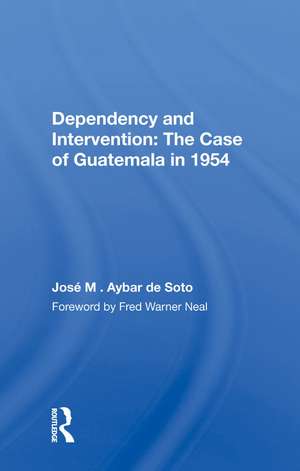Dependency And Intervention: The Case Of Guatemala In 1954
Autor José M. Aybar de Sotoen Limba Engleză Hardback – 7 iun 2019
Preț: 764.20 lei
Preț vechi: 1027.40 lei
-26% Nou
Puncte Express: 1146
Preț estimativ în valută:
146.24€ • 151.82$ • 121.95£
146.24€ • 151.82$ • 121.95£
Carte tipărită la comandă
Livrare economică 22 martie-05 aprilie
Preluare comenzi: 021 569.72.76
Specificații
ISBN-13: 9780367017606
ISBN-10: 0367017601
Pagini: 398
Dimensiuni: 152 x 229 mm
Greutate: 0.45 kg
Ediția:1
Editura: Taylor & Francis
Colecția Routledge
Locul publicării:Oxford, United Kingdom
ISBN-10: 0367017601
Pagini: 398
Dimensiuni: 152 x 229 mm
Greutate: 0.45 kg
Ediția:1
Editura: Taylor & Francis
Colecția Routledge
Locul publicării:Oxford, United Kingdom
Cuprins
Foreword -- Preface -- Statement of Inquiry for the Study of Intervention -- Development: A Critique -- Toward a General Theoretical Construct of Dependency -- The Rise and Fall of Ubico -- The Struggle for Revolutionary Survival -- The Land Tenure Pattern of Guatemala and the Agrarian Reform Law of 1952 -- The Expropriation of the Private Sector and Guatemalan Dependency on the United States -- In Defense of the UFCO: United States Intervention in Guatemala -- The Guatemalan Appeal Before the OAS and UN -- Conclusions and General Observations -- United Nations Charter1 -- Appendix B
Descriere
The government that took power during the 1944 Guatemalan revolution began gradually to prepare the legal foundation for the agrarian reform considered essential to Guatemala's development. After Colonel Jacobo Arbenz Guzman was elected president in 1951, he moved to fulfill his campaign promises by applying the Agrarian Reform Law to the United Fruit Company. This action set off a chain of events that culminated in U.S. intervention in 1954. This study examines the phenomenon of intervention by a dominant, developed nation-state (metropole) into the internal affairs of an underdeveloped nation-state. The author builds a theoretical construct--integrating the predominant tenets of dependency and core interests theory--which he applies to the case of Guatemala; he then presents conclusions and general observations based on the relationship of the theory to the case study. Dr. Aybar describes in detail, and with unusual clarity, the interlocking relationship of government and multinational corporations (MNCs) that led to U.S. intervention in Guatemala, and explains the intervention in terms of the continuous penetration of the extended domain of the metropole, as well as the metropole's defense of the interests of its MNCs.
